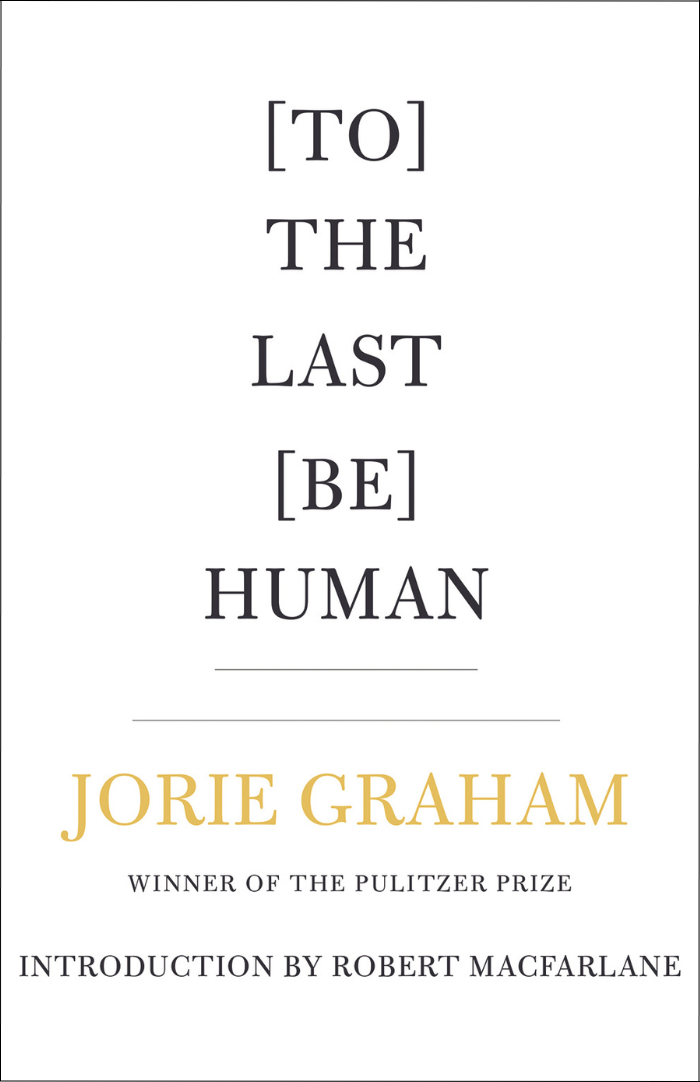
[To] The Last [Be] Human collects four extraordinary poetry books—Sea Change, Place, Fast, and Runaway—by Pulitzer Prize winner Jorie Graham, presenting a body of work that stands as a “lyric record” of the calamitous decades that began the twenty-first century.
From the introduction by Robert Macfarlane:
This glittering, teeming Anthropocene journal is…rife with hope and raw with loss, lush and sparse, hard to parse and hugely powerful to experience. As these poems face our planet’s deep-time future, their shadows are cast by the long light of the will-have-been. Made of more durable materials than granite and concrete, their tasks are of record as well as of warning: to preserve what it felt like to be a human in these accelerated years when “the future / takes shape / too quickly.”…To read these four books in a single volume is to experience vastly complex patterns forming and reforming in mind, eye, and ear. These poems sing within themselves, between one another, and across collections, and the song that joins them all is uttered simply in the first lines of the last poem of the last book:
The earth said
remember me.
The earth said
don’t let go,
said it one day
when I was
accidentally
listening…
ISBN: 9781556596605
Format: Paperback
“Collecting Graham’s four stellar eco-poetic volumes, this searing and sensitive portrait of environmental contingency is as formally ambitious as it is captivating and wise. As Robert Macfarlane aptly writes in his beautiful introduction, the task of these poems is one ‘of record as well as of warning: to preserve what it felt like to be a human in these accelerated years ‘when the future / takes shape / too quickly.’. . . To hold these volumes together is to have proof of Graham’s unmatched powers and to reckon with the resilience the present age demands.”—Publishers Weekly, starred review
“This omnibus edition of Graham’s four most recent poetry books reifies her turn toward the climate crisis as a theme, but also highlights the way her great subject has always been and continues to be human consciousness, the manifold and many-folded self.” —New York Times, Editors Choice
“Why think, why write, why break the silence? I have wondered sometimes if global warming makes our own deaths feel more real, as though threats to civilization were an overdeath, as though we had to die twice. But if ‘the synthetic materials last forever,’ as Graham writes in ‘Deep Water Trawling’ (our plastics are destined to outlive our species), there is also a sense in which our work lasts forever. ‘What the lips just inconceivably apart can make,’ she wrote in ‘The End of Beauty,’ ‘cannot then, ever again, be uncreated.’” —The New York Times
“One of our great literary mappers of everything, everywhere all at once. . . . Graham is a chronicler of bigness, the overawing bigness of our planet but also the too-bigness, at times, of the self. . . . Our own comprehension of enormity, Graham writes, slides off of us ‘like a ring into the sea.’ It’s a truism that poetry’s task is finding amazement in the everyday. Graham turns this into a terrifying as well as a moral project. (In her ocean metaphor, the ring is vast, and the unknowingness in which we lose it is vaster still. Perhaps her poems are salvage divers.).”—New Yorker
“If readers imagine this book, as Graham does, as an artifact to be ‘dug up from rubble in the future,’ it maintains value for later readers from distant generations or civilizations. In this sense, Graham’s depiction of a world in the midst of its own ruin serves less as an antidote for impending devastation—it’s too late for that—than as a minority report on our humanistic response to it, one that might persist, as Macfarlane says, across ‘the long light of the will-have-been,’ even if we’ve failed to correct the course of our environmental history.” —Los Angeles Review of Books
“A monumental exploration of consciousness in an age of ecological, political, and existential crisis.” —New Yorker, Best Books of 2022
“This new poetry book is filled with an invented form that would take me hundreds of words to adequately describe. A specific alternation of long lines and several short lines that start halfway across the page creates an undulating, rhythmic effect. You just have to read it to understand. It’s very cool.” —Book Riot
“Graham is a master of her craft, perhaps unparalleled at reflecting the human condition as we approach a post-human world. To read her is to enter a world of meditative beauty and metaphysical loneliness; that such private states can be made so touchingly public is her great gift.” —Rain Taxi
“One of the greatest living ecopoetic writers, Graham is an essential voice in American poetry. This volume, which compiles her latest four collections, paints a dazzling and often unnerving portrait of environmental contingency in poems that ambitiously and unblinkingly tackle all aspects of the human experience. Graham’s power as a thinker and poet shines in these pages.” —Publishers Weekly, Best Books of 2022
“Four of Graham’s seminal works are collected and serve as a lyric testament to the poet’s writing on climate change and loss, while also celebrating the beauty and gifts of the world.” —Publishers Weekly Fall Announcements Top Ten
“Jorie Graham faces the future anguished but unblinking in this magnificent collection of her four most recent books. . . . Their importance goes beyond the literary. . . . She is weathervane, sentinel, about-to-be lost soul. What makes her work required reading is her readiness to go where angels fear to write, to do the terrifying work of visualizing the future. . . . At 72, Graham is writing for her life, and ours.” —The Guardian
“This collection gives the reader the sensation of everything happening at once, an acceleration so complete that it feels like the apocalyptic end has already arrived. . . . To go about daily life, I am suspended between resignation and activism, and engage in too little of the latter. Graham’s tetralogy gives the reader a different possibility: adaptation and radical witness. Her language and poetic structure adapt to her changing world and reality, and never succumbs to denial.” —The Rumpus
“Jorie Graham’s urgent and despairing [To] The Last [Be] Human stands as a thick and insistent testament of our time—this time of human-driven ecological crises.” —Orion
“Graham’s 15th collection takes on the inevitability of extinction—of the individual narrator, of species and of the planet itself. If that sounds grim, it’s anything but: this is an urgent, vivacious book based in stark reality but written with craft and beauty.”—Financial Times
“We have already been warned about the dangers in our future. Ultimately, and with startling clarity and efficacy, Graham’s work implores readers to slow down and listen to that warning.”—Times Literary Supplement
